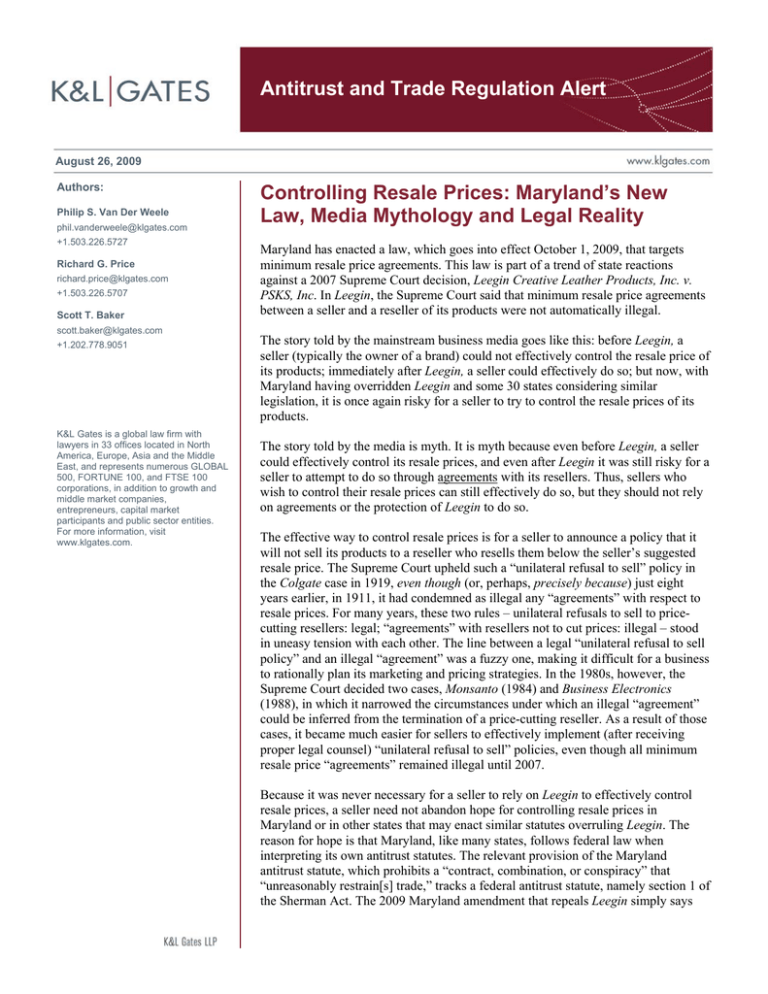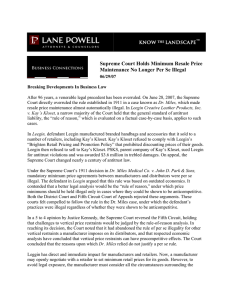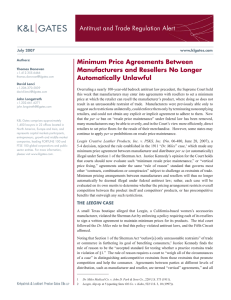
Antitrust and Trade Regulation Alert
August 26, 2009
Authors:
Philip S. Van Der Weele
phil.vanderweele@klgates.com
+1.503.226.5727
Richard G. Price
richard.price@klgates.com
+1.503.226.5707
Scott T. Baker
Controlling Resale Prices: Maryland’s New
Law, Media Mythology and Legal Reality
Maryland has enacted a law, which goes into effect October 1, 2009, that targets
minimum resale price agreements. This law is part of a trend of state reactions
against a 2007 Supreme Court decision, Leegin Creative Leather Products, Inc. v.
PSKS, Inc. In Leegin, the Supreme Court said that minimum resale price agreements
between a seller and a reseller of its products were not automatically illegal.
scott.baker@klgates.com
+1.202.778.9051
K&L Gates is a global law firm with
lawyers in 33 offices located in North
America, Europe, Asia and the Middle
East, and represents numerous GLOBAL
500, FORTUNE 100, and FTSE 100
corporations, in addition to growth and
middle market companies,
entrepreneurs, capital market
participants and public sector entities.
For more information, visit
www.klgates.com.
The story told by the mainstream business media goes like this: before Leegin, a
seller (typically the owner of a brand) could not effectively control the resale price of
its products; immediately after Leegin, a seller could effectively do so; but now, with
Maryland having overridden Leegin and some 30 states considering similar
legislation, it is once again risky for a seller to try to control the resale prices of its
products.
The story told by the media is myth. It is myth because even before Leegin, a seller
could effectively control its resale prices, and even after Leegin it was still risky for a
seller to attempt to do so through agreements with its resellers. Thus, sellers who
wish to control their resale prices can still effectively do so, but they should not rely
on agreements or the protection of Leegin to do so.
The effective way to control resale prices is for a seller to announce a policy that it
will not sell its products to a reseller who resells them below the seller’s suggested
resale price. The Supreme Court upheld such a “unilateral refusal to sell” policy in
the Colgate case in 1919, even though (or, perhaps, precisely because) just eight
years earlier, in 1911, it had condemned as illegal any “agreements” with respect to
resale prices. For many years, these two rules – unilateral refusals to sell to pricecutting resellers: legal; “agreements” with resellers not to cut prices: illegal – stood
in uneasy tension with each other. The line between a legal “unilateral refusal to sell
policy” and an illegal “agreement” was a fuzzy one, making it difficult for a business
to rationally plan its marketing and pricing strategies. In the 1980s, however, the
Supreme Court decided two cases, Monsanto (1984) and Business Electronics
(1988), in which it narrowed the circumstances under which an illegal “agreement”
could be inferred from the termination of a price-cutting reseller. As a result of those
cases, it became much easier for sellers to effectively implement (after receiving
proper legal counsel) “unilateral refusal to sell” policies, even though all minimum
resale price “agreements” remained illegal until 2007.
Because it was never necessary for a seller to rely on Leegin to effectively control
resale prices, a seller need not abandon hope for controlling resale prices in
Maryland or in other states that may enact similar statutes overruling Leegin. The
reason for hope is that Maryland, like many states, follows federal law when
interpreting its own antitrust statutes. The relevant provision of the Maryland
antitrust statute, which prohibits a “contract, combination, or conspiracy” that
“unreasonably restrain[s] trade,” tracks a federal antitrust statute, namely section 1 of
the Sherman Act. The 2009 Maryland amendment that repeals Leegin simply says
Antitrust and Trade Regulation Alert
that a “contract, combination, or conspiracy that
establishes a minimum price below which a
[reseller] may not sell” is, in and of itself, an
“unreasonable restraint of trade.” The amendment
does not purport to change what constitutes a
“contract, combination, or conspiracy.” Therefore,
federal law will still guide the Maryland courts on
that point. Accordingly, the three Supreme Court
decisions (Colgate, Monsanto, and Business
Electronics) that take unilateral refusal to sell
polices outside of the definition of a “contract,
combination, or conspiracy,” i.e., outside the
definition of an “agreement,” are still good law in
Maryland. Those decisions protect a properlystructured unilateral refusal to sell policy in
Maryland, notwithstanding Maryland’s amendment
overruling Leegin, just as they protected such
policies in Maryland (and elsewhere) for many
years even before the Supreme Court decided
Leegin in 2007.
Caution: K&L Gates emphasizes that the
implementation of a unilateral policy of not selling
to price cutters requires the involvement of legal
counsel in all phases – planning, drafting, training,
and termination.This e-alert is not intended to give
advice on how to implement such a policy, and no
one should rely on it as such. Sellers should consult
with competent legal counsel before implementing
unilateral policies to control resale prices.
Anchorage Austin Beijing Berlin Boston Charlotte Chicago Dallas Dubai Fort Worth Frankfurt Harrisburg Hong Kong London
Los Angeles Miami Newark New York Orange County Palo Alto Paris Pittsburgh Portland Raleigh Research Triangle Park
San Diego San Francisco Seattle Shanghai Singapore Spokane/Coeur d’Alene Taipei Washington, D.C.
K&L Gates is a global law firm with lawyers in 33 offices located in North America, Europe, Asia and the Middle East, and represents numerous
GLOBAL 500, FORTUNE 100, and FTSE 100 corporations, in addition to growth and middle market companies, entrepreneurs, capital market
participants and public sector entities. For more information, visit www.klgates.com.
K&L Gates comprises multiple affiliated partnerships: a limited liability partnership with the full name K&L Gates LLP qualified in Delaware and
maintaining offices throughout the United States, in Berlin and Frankfurt, Germany, in Beijing (K&L Gates LLP Beijing Representative Office), in
Dubai, U.A.E., in Shanghai (K&L Gates LLP Shanghai Representative Office), and in Singapore; a limited liability partnership (also named K&L
Gates LLP) incorporated in England and maintaining offices in London and Paris; a Taiwan general partnership (K&L Gates) maintaining an office in
Taipei; and a Hong Kong general partnership (K&L Gates, Solicitors) maintaining an office in Hong Kong. K&L Gates maintains appropriate
registrations in the jurisdictions in which its offices are located. A list of the partners in each entity is available for inspection at any K&L Gates office.
This publication is for informational purposes and does not contain or convey legal advice. The information herein should not be used or relied upon
in regard to any particular facts or circumstances without first consulting a lawyer.
©2009 K&L Gates LLP. All Rights Reserved.
August 26, 2009
2



